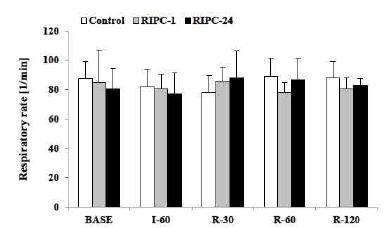Abstract
Purpose:
To compare early- and late-effect remote ischemic preconditioning (RIPC) by analysing the microcirculatory, hemodynamic and histological changes in partial liver ischemia-reperfusion of rats.
Methods:
60-minute partial liver ischemia followed by 120-minute reperfusion was performed without (Control group, n=7) or with preconditioning. In RIPC groups a tourniquet was applied around the left thigh using 3 cycles of 10-minute ischemia/10-minute reperfusion, one (RIPC-1, n=7) or twenty-four hours (RIPC-24, n=7) before I/R. Hemodynamic and microcirculatory measurements were performed before and after ischemia and in 30th, 60th and 120th minute of reperfusion and histological examination at the end of reperfusion.
Results:
Blood pressure decreased in all groups followed by biphasic changes in Control group. In RIPC groups R120 values returned almost to normal. Heart rate increased in Control and RIPC-1 groups at R120, while RIPC-24 did not show significant changes. Microcirculation of non-ischemic liver stayed constant in Control and showed significant changes in RIPC-24 group, while in ischemic liver elevated by R120 in all groups. RIPC didn’t reduce histological alterations.
Conclusion:
Considering the survival and the results, both remote ischemic preconditioning protocols had beneficial effect in hepatic ischemia-reperfusion, however the histopathological findings were controversial.
Key words:
Ischemia; Reperfusion; Ischemic Preconditioning; Microcirculation; Histology; Liver; Rats






